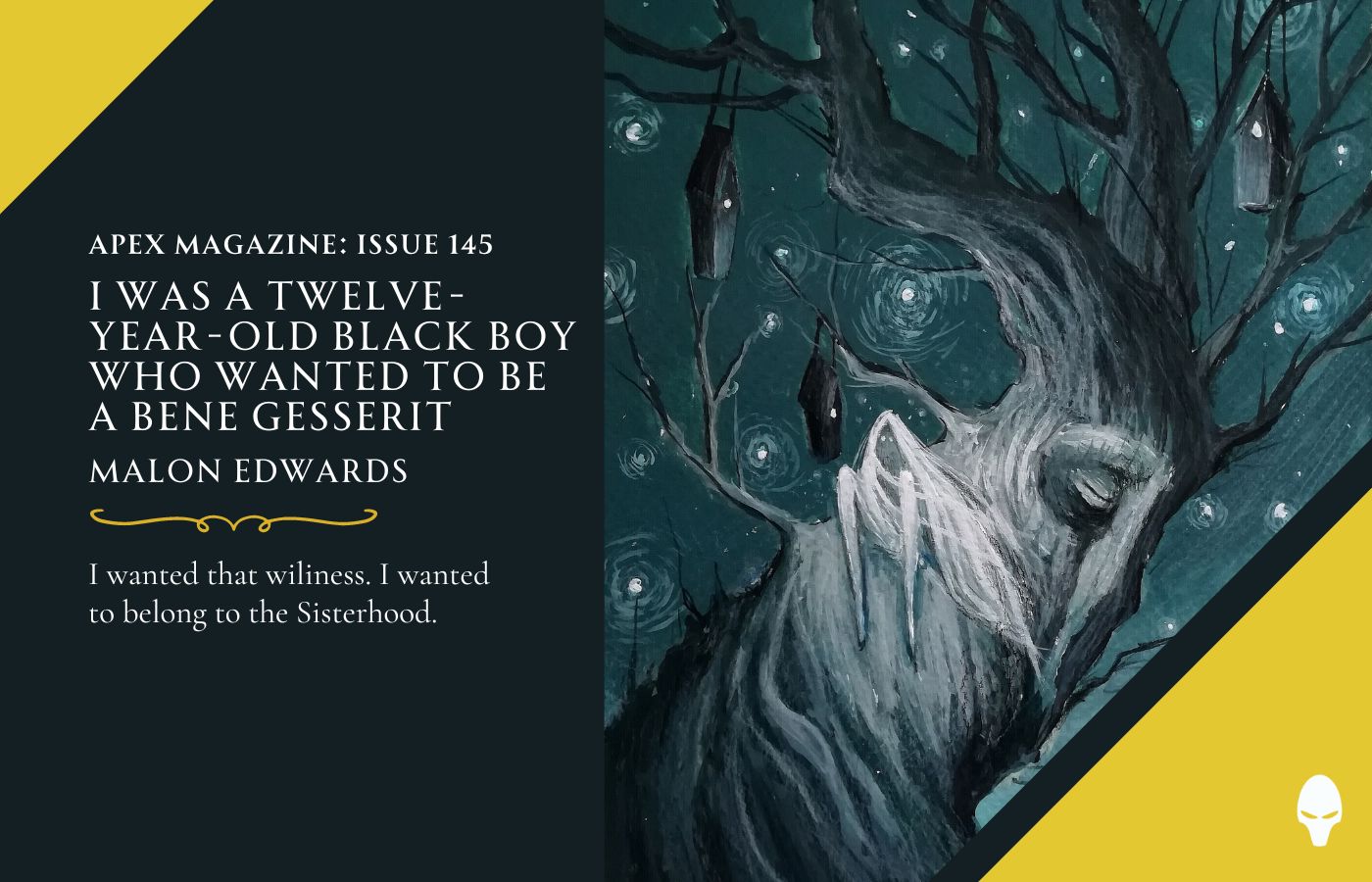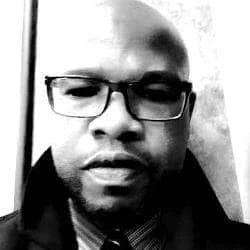
I first read Frank Herbert's Dune when I was about eight or nine years old. It was on my older sister's bookshelf. Her room was up the steps from mine, and it was an enchanting place. My sister was (and still is) a huge Star Wars fan. She displayed models on her desk. I thought they were toys. I'm embarrassed to admit how many I broke and how many pieces I lost.
Mia is ten years older than me. When she went away to college, she took the Star Wars toys that survived my curiosity. I was disappointed. So, I focused on her bookshelf.
It was low, built into the wall, and on both sides of the door when I entered her room. Perfect for my height. She had so many books, but I can only remember three of them: The Catcher in the Rye, Do Patent Leather Shoes Really Reflect Up?, and Dune.
I'd always been fascinated with planets and the universe. My mother would buy me any book I wanted, as she did for my sister. I asked for every astronomy guide I saw, and when I brought them home, I knelt on the floor with my bed as my desk. I copied all their information into the yellow legal pads my mother gave me. I drew and colored the planets and the moons and wrote their entries with a careful hand. (Take note, parents: astronomy is nothing but a benefit.)
My sister saw my interest in space and astronomy and encouraged me to write science fiction short stories. She also pointed out Dune on her shelf and suggested I read it, even at that age.
I'd seen it. But I hesitated to read it. The book blurb told me it wasn't like The Catcher in the Rye. I'd learned more than I should have at that age from J.D. Salinger. I never wanted to be Holden Caufield, but his life fascinated nine-year-old me. I wanted to read books with more characters like him. But my sister didn't have any more books like that on her shelf.
So, I tried Dune.
At first, I didn't understand Dune. I didn't talk to my sister about it, she was away at college. After reading The Catcher in the Rye and Do Patent Leather Shoes Really Reflect Up? and not discussing them with her, I was used to trying to figure out characters and their actions on my own.
Even though I was confused by a lot of what happened in Dune, I wasn't discouraged. I was captivated by this Sisterhood of women who controlled their bodies at the cellular level and advised the rich and powerful with underlying clandestine intentions. And the high and mighty knew this. Yet, they could do nothing because they were outmatched by these intricate Bene Gesserit machinations.
I wanted that wiliness. I wanted to belong to the Sisterhood.
My mom remarried when I was ten years old, and suddenly, I had four brothers. Two older, and two younger.
We teased each other mercilessly. And delighted with evil glee when the Teased One ran away crying or responded with rage and awkward fury and insults that cut deep. Some of those cuts are keloid scars now.
I really got into Dune two years after that remarriage. It was comfort. It was solace. It was a manifesto.
Before that, when I was about eleven years old, I first saw The Exorcist. My stepbrothers and I were in the basement of their house, before their family moved in with my family. It was a large, unfamiliar space.
The movie ended late, and we were tired. We'd decided to sleep downstairs. When my oldest brother turned off the television and the lights,I freaked out. I yelled for him to turn the lights back on.
I'm forty-eight years old, and I'm still embarrassed whenever I think about that night. I haven't reacted like that again, though. Not at anything. A well-trained Bene Gesserit wouldn't allow herself, as Lady Jessica showed me early in Dune.
The Litany Against Fear is a trusted calming technique, but Lady Jessica didn't recite it after Paul met Reverend Mother Gaius Helen Mohiam and before he put his hand in the gom jabbar. She handled her fear in a way I could (and tried to emulate):
"Jessica's hand went to Paul's shoulder, tightened there. For a heartbeat, fear pulsed through her palm. Then she had herself under control." Frank Herbert, Dune, (G.P. Putnam's Sons, Special Markets hardcover edition, September 2005) page 6
Herbert didn't tell me how she got herself under control. He left that for me to imagine. And since he didn't describe her screaming or yelling or crying or raging against Reverend Mother Gaius Helen Mohaim, I believed Jessica created the inner calm she found in that quick, quiet moment.
When Paul told Jessica a hunter-seeker tried to assassinate him in their new home on Arrakis, she didn't lose her shit like I did after watching The Exorcist. She relied on her Bene Gesserit conditioning:
"But Jessica remained inwardly tense, thinking: A hunter-seeker! Merciful Mother! It took all her training to prevent a fit of hysterical trembling." Frank Herbert, Dune, (G.P. Putnam's Sons, Special Markets hardcover edition, September 2005) page 79
Fear wasn't the only emotion Herbert showed me Jessica could control. When Duncan Idaho came back to the castle drunk, it pissed Jessica off when she told him to drink caffeine to sober up and he accused her of espionage. Again, I saw Jessica calm herself, using her own inner quiet. Just as when she later drank the Water of Life to become the Reverend Mother for Stilgar's sietch, removing its poison and making it safe for the Fremen: "...she swallowed it, fighting to retain her calmness and dignity."
This, I realized, was me whenever I fled to my room to read after I got angry at my brothers. I shared a room with my oldest brother, but he often let me have our space to myself. With the door closed as I read, the sounds of my brothers downstairs were faint. The room was quiet, like the "whirling silence [that] settled around Jessica" as she consumed more of the Water of Life.
I valued quietude. I embodied quietude. It's my stillsuit, my protection against this harsh world.
Like the Atreides who had just moved to Arrakis, a world they didn't know, I and my four new brothers I really didn't know had moved to a white suburb none of us knew. In this new place, I combined my quietude with a certain look on my face, like the calculated moments of quiet Jessica used when she met Shadout Mapes.
I don't know how to describe that look. And I don't have to look in the mirror to check if I've put it on. My face just does it. And it feels right.
If I had to use a word to describe the look, it would be "malonic." That's a nickname a very good friend gave me in college. And it makes sense.
For one reason or another, I was always mad at my brothers, but I conditioned myself to be calm and quiet to make sure my malonic face showed and not my anger. I didn't want to be seen as a stereotypical young Black boy. So, I converted that poison of anger into non-aggressive quiet.
I stopped smiling when taking pictures. It didn't feel right.
I didn't smile at my mother. I didn't smile at my stepfather. I didn't smile at my sister. I didn't smile at any of my brothers. And I especially didn't smile at my classmates or my teachers.
In eleventh grade, when my English teacher called me to her desk to give me my school picture, as she'd done for the rest of the class, she told me in a low voice, "You should smile. I'm sure you have a nice one. And some people don't trust people who don't smile."
That English teacher was white, as were almost all of the teachers and most of the students in high school. She might have been the same age I am now. She saw the slow demographic change affecting the high school, and our suburb. I understood her implied message. I understood she said it out of what she believed was kind advice.
I didn't need to use my bootleg Bene Gesserit skills to read between the lines. I lived inside those lines every day.
I still do. And I still wear my malonic face.
Not everyone sees my face as a placid expression, though. People said then, and continue to say now, that I'm standoffish. Serious. Mean looking. Scary looking.
Unfortunately, my wife and children notice. And they call me out on it, as they should. I do try to smile more. But my calm and quiet is instinctive, a protective measure I've honed over the years. My version of tranquility is on my face and all around me. Like the whirling silence that settled around Jessica.
And I embrace it.
In a way, Jessica, the Bene Gesserit, and Dune allowed a teenage Black boy from the South Side of Chicago to survive adolescence. To become a male Bene Gesserit. With my own sense of serenity.
It's tripped out that I've always known a Bene Gesserit uses her smile in calculated ways. But I never have. Still, malonic look is effective.
Though, every now and then, I try my best to show people how nice my smile looks. I can't keep everyone at a distance forever. But it's hard to break habits.
Comfort is familiar. Comfort is safe. Comfort works. And if that’s not a Gesserit mantra, I don’t know what is.









